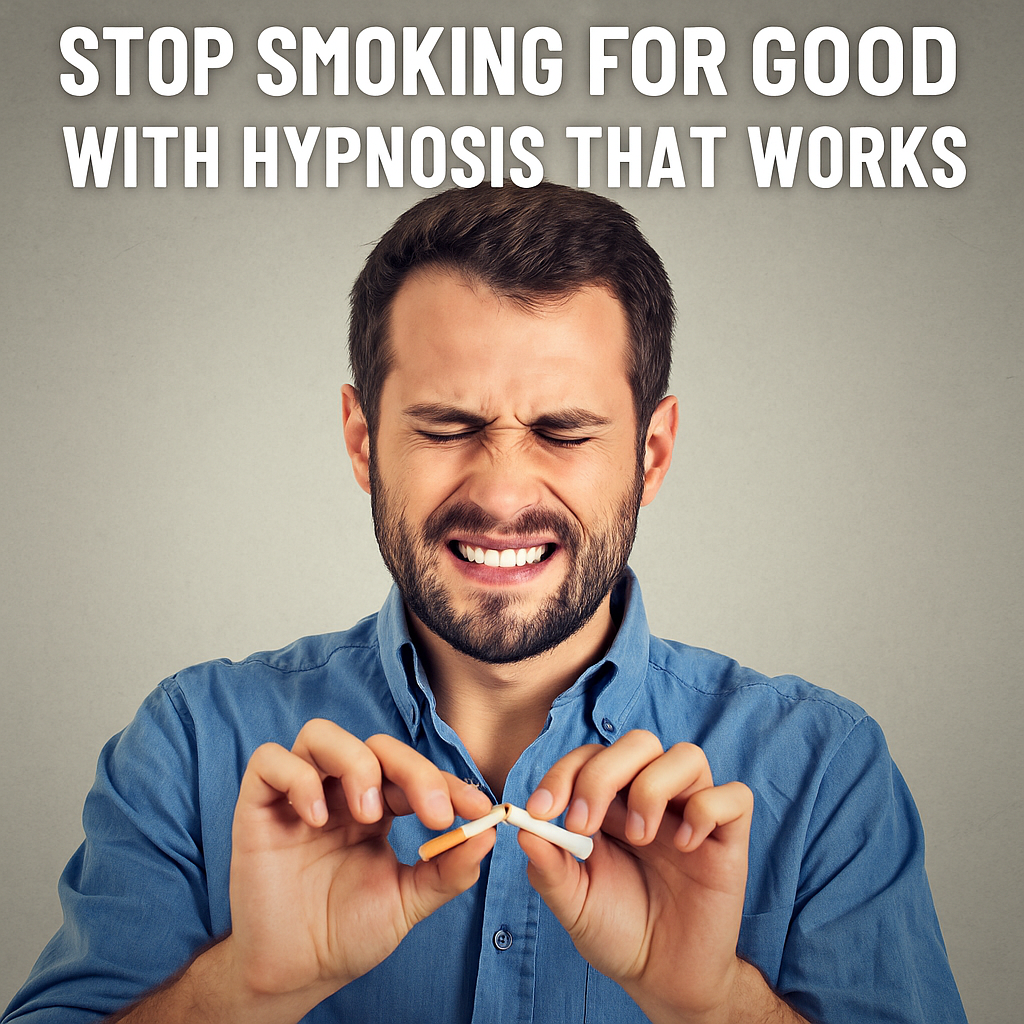Breaking Free: Use Hypnosis To Quit Smoking and Conquer Anxiety
Quitting smoking is a journey fraught with challenges, and for many, the struggle extends beyond the physical addiction to nicotine. Anxiety, stress, and emotional triggers often accompany attempts to break free from the grip of smoking, making it a daunting endeavor. Fortunately, hypnosis offers a promising solution for those seeking to quit smoking while managing anxiety effectively. In this article, we delve into the powerful synergy between hypnosis and smoking cessation, exploring how this holistic approach can empower individuals to overcome their addiction and reclaim control over their lives.

To comprehend the effectiveness of hypnosis to quit smoking, it’s crucial to first understand the intricate relationship between smoking and anxiety. For many smokers, cigarettes serve as a coping mechanism for managing stress and anxiety, providing a temporary escape from life’s challenges. However, this reliance on smoking as a form of self-medication perpetuates a vicious cycle, exacerbating feelings of anxiety and dependency. Breaking free from this cycle requires addressing the underlying emotional triggers and developing healthier coping strategies, which is where hypnosis proves invaluable.
Hypnosis operates on the principle of accessing the subconscious mind to effect positive behavioral change. During a hypnosis session focused on smoking cessation, individuals are guided into a deeply relaxed state where their subconscious mind becomes highly receptive to suggestion. Hypnotic suggestions are then utilized to reprogram ingrained patterns of thought and behavior associated with smoking, such as cravings, triggers, and negative associations. Through repetition and reinforcement, these suggestions help individuals develop new, healthier habits and coping mechanisms, effectively breaking the cycle of addiction .
In addition to targeting smoking cessation directly, hypnosis can also address the underlying anxiety and stress that often accompany the quitting process. Hypnotherapy techniques such as relaxation exercises, visualization, and positive affirmations can help individuals manage anxiety more effectively, reducing the likelihood of relapse. By promoting a sense of inner calmness and resilience, hypnosis equips individuals with the tools they need to navigate challenging situations without turning to cigarettes for relief.
Numerous studies have demonstrated the efficacy of hypnosis as a complementary approach to smoking cessation. Research published in the Journal of Nursing Scholarship found that smokers who underwent hypnotherapy were more likely to remain abstinent from smoking compared to those who received conventional counseling. Furthermore, a study published in Nicotine & Tobacco Research concluded that hypnosis was consistently more effective than behavioral counseling in helping individuals quit smoking (at the end of the treatment period, 39% of participants in the hypnosis group had quit smoking compared to 18% in the behavioral counseling group). These findings underscore the potential of hypnosis as a valuable tool in the fight against smoking addiction.
If you’re considering using hypnosis to quit smoking, here are some practical tips to help you get started:
- Find a qualified hypnotherapist: Look for a certified hypnotherapist with experience in smoking cessation. A professional who specializes in this area will be able to tailor the hypnosis sessions to your specific needs and goals.
- Set clear intentions: Before beginning hypnotherapy, take some time to reflect on your reasons for wanting to quit smoking and what you hope to achieve. Setting clear intentions will help guide the hypnotic suggestions and maximize the effectiveness of the sessions.
- Stay committed: Quitting smoking requires dedication and persistence. While hypnosis can be a powerful tool, it’s essential to approach the process with a willingness to change and a commitment to your health and well-being.
- Practice relaxation techniques: In addition to hypnosis sessions, incorporate relaxation techniques such as deep breathing, meditation, and mindfulness into your daily routine. These practices can help reduce stress and anxiety, making it easier to resist the urge to smoke.
Hypnosis offers a transformative approach to smoking cessation that addresses both the physical addiction to nicotine and the underlying emotional factors that contribute to smoking behavior. By harnessing the power of the subconscious mind, hypnosis can help individuals break free from the grip of smoking, manage anxiety more effectively, and embark on a journey towards improved health and well-being. Whether used as a standalone treatment or in conjunction with other smoking cessation strategies, hypnosis holds immense promise for those seeking a path to a smoke-free life.
*I’ve helped thousands of people break bad habits and build strong self-esteem while also freeing them from smoking, vaping, and chewing. Learn how I can help YOU today.
The post Breaking Free: Use Hypnosis To Quit Smoking and Conquer Anxiety first appeared on Indy Hypnosis Center.



